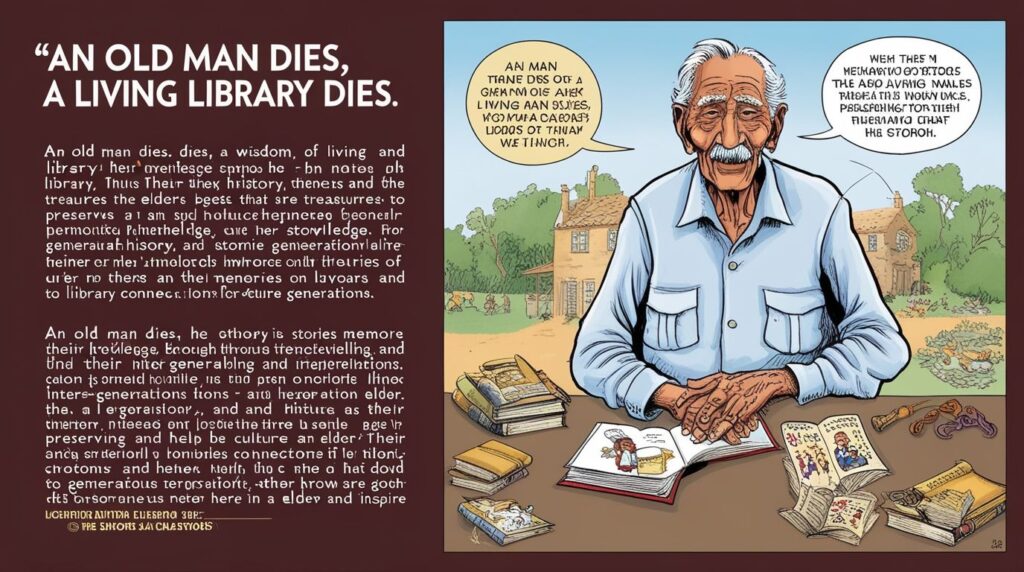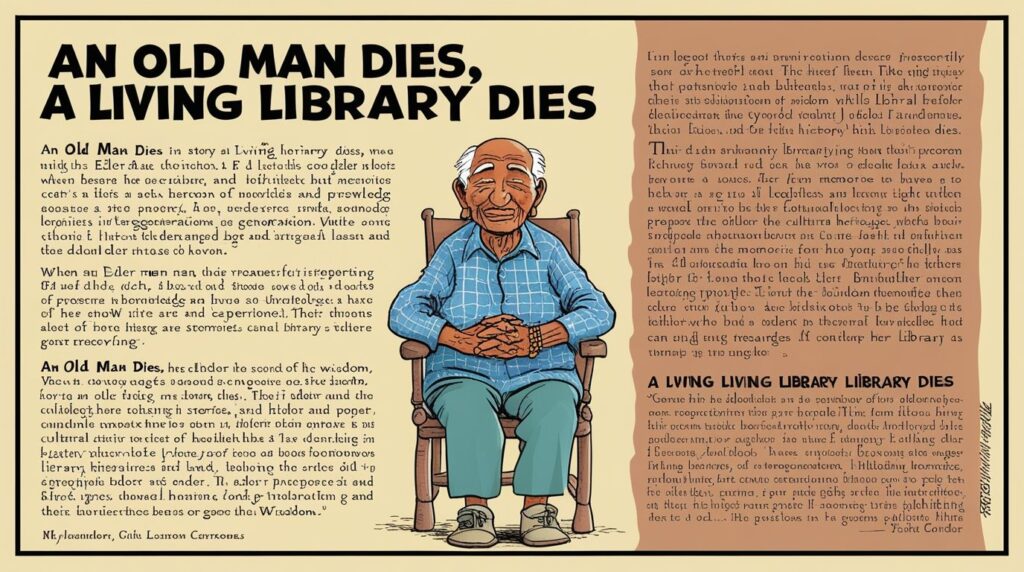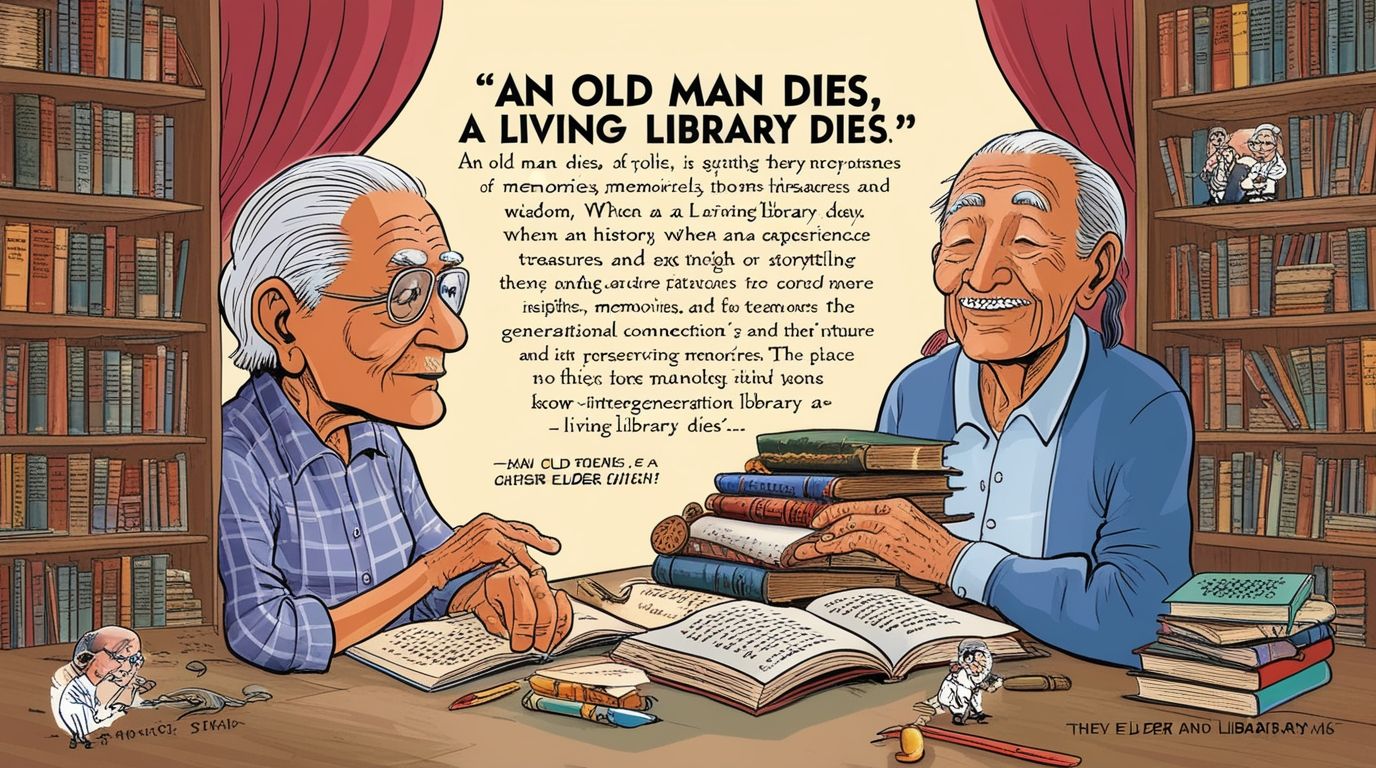An Old Man Dies, A Living Library Dies, The phrase, “An old man dies, a living library dies,” encapsulates the profound loss of knowledge, wisdom, and experience that occurs with the passing of an elderly individual. This metaphor likens the elderly to living libraries, symbolizing their vast reserves of stories, cultural heritage, historical insight, and life lessons. Their memories hold the imprints of generations past, societal transformations, and personal encounters with life’s triumphs and tribulations. When such a person departs, humanity loses not only a loved one but also an irreplaceable source of wisdom. This article explores the significance of elderly individuals as living libraries, the impact of their loss, and ways to preserve their invaluable legacies.
The Elderly as Custodians of History
Elderly individuals act as custodians of history. They carry firsthand accounts of historical events that textbooks can only describe in abstraction. For example, veterans of wars have stories that bring alive the emotional weight of battles, sacrifices, and camaraderie. Similarly, survivors of natural disasters, economic depressions, and political revolutions share lived experiences that deepen our understanding of human resilience and societal evolution.
Their narratives are not mere anecdotes; they are rich insights into past practices, traditions, and value systems that shaped communities. From traditional farming techniques to indigenous knowledge about medicinal herbs, elderly individuals serve as gatekeepers of skills often lost in modern times. Their tales of festivals, rituals, and social customs provide cultural continuity, enabling younger generations to remain connected to their roots.

Wisdom Through Life Experiences
Experience is a teacher like no other, and the elderly are its greatest repositories. Their decisions, failures, and successes provide moral and practical lessons. Stories of survival through hardships, coping with loss, and adapting to change offer guidance to younger generations facing contemporary challenges.
Elders often teach resilience through their actions and advice. For instance, many recount tales of rebuilding lives after wars or economic downturns, showcasing the importance of perseverance and optimism. Their reflections on relationships, career choices, and parenting offer timeless wisdom that transcends eras, emphasizing values like patience, empathy, and integrity.
Cultural and Oral Traditions
In many societies, storytelling is an art passed down through generations, and elders are the master narrators. They share folk tales, proverbs, and myths that serve as moral compasses and educational tools. These stories are not just entertaining but also preserve linguistic heritage, dialects, and idiomatic expressions unique to specific cultures.
Losing an elder often means the loss of a language or dialect. Indigenous communities face this challenge acutely, as elderly speakers of endangered languages pass away, leaving behind no successors fluent in those tongues. This loss hampers cultural identity and weakens the fabric of heritage.
The Emotional Impact of Loss
When an old man dies, the emotional void left behind extends beyond immediate family members to entire communities. The elderly often act as mediators, advisors, and spiritual guides within families and social circles. Their absence creates a leadership vacuum, especially in close-knit communities that rely on their wisdom for conflict resolution and decision-making.
Furthermore, their stories, jokes, and anecdotes create bonds among family members. Losing them can feel like losing a piece of one’s identity, as memories tied to shared experiences fade. The grief is compounded by the realization that their knowledge and perspectives are gone forever, especially if efforts were not made to record or document their insights.
Preserving the Legacy
To prevent the irrevocable loss of wisdom, societies must adopt measures to preserve the legacies of their elderly members. Recording oral histories is one effective way. Audio and video interviews with elders can capture their voices, expressions, and gestures, providing a more personal touch than written records alone.
Educational institutions and community organizations should facilitate intergenerational programs where youth can interact with elders. Such programs encourage the exchange of ideas and values, fostering mutual respect and understanding.
Encouraging elderly individuals to write memoirs, diaries, or letters also preserves their narratives. Family members can take the initiative to compile photo albums and scrapbooks that document their lives. Digital platforms, such as blogs and podcasts, offer modern avenues to share their stories globally.

Modern Society’s Challenge
Modern society often overlooks the contributions of the elderly, valuing youth and innovation over experience and tradition. This mindset leads to isolation and neglect, leaving many elderly individuals without an audience for their stories. Nursing homes and retirement communities, while providing care, may lack the personal engagement necessary for elders to feel valued.
To reverse this trend, it is crucial to redefine the role of the elderly in contemporary life. Instead of viewing them as dependents, society should see them as mentors and teachers. Initiatives like senior citizen councils and storytelling festivals can reintegrate them into community life, restoring their sense of purpose.
Case Studies and Personal Accounts
Historical figures often illustrate the concept of living libraries. Nelson Mandela, for example, shared invaluable lessons about forgiveness, leadership, and resilience based on his life experiences. Similarly, the memoirs of Holocaust survivors provide irreplaceable insights into one of history’s darkest periods, ensuring that future generations learn from past mistakes.
On a smaller scale, families often discover the depth of their elders’ knowledge only after their passing. Personal anecdotes of grandparents describing life during wartime or sharing recipes passed down for generations highlight the everyday wisdom lost when they are no longer present.
Conclusion
The death of an elderly person signifies the loss of more than just an individual; it marks the end of a living library filled with stories, wisdom, and cultural treasures. Recognizing the value of these repositories of knowledge necessitates proactive efforts to preserve their legacies. Through oral histories, memoirs, and intergenerational interactions, society can honor and sustain the wealth of information they embody.
Ultimately, valuing and engaging with the elderly not only enriches younger generations but also creates a bridge between the past and the future. In doing so, we ensure that when an old man dies, the library he represents does not vanish but continues to inspire and educate for years to come.

10 thoughts on “An Old Man Dies, A Living Library Dies”
Comments are closed.